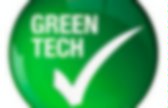

Big Data and Energy: A Clear Synergy. Consider that, according to industry researchers, if smart meters were incorporated across the U.S., they would generate five times the data of the current AT&T network.
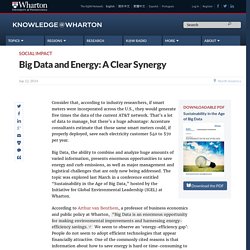
That’s a lot of data to manage, but there’s a huge advantage: Accenture consultants estimate that those same smart meters could, if properly deployed, save each electricity customer $40 to $70 per year. Big Data, the ability to combine and analyze huge amounts of varied information, presents enormous opportunities to save energy and curb emissions, as well as major management and logistical challenges that are only now being addressed. The topic was explored last March in a conference entitled “Sustainability in the Age of Big Data,” hosted by the Initiative for Global Environmental Leadership (IGEL) at Wharton.
The promise is clear. “Connected machines could eliminate up to $150 billion in waste across industries,” said Paul Rogers, GE’s chief development officer and a keynote speaker at the IGEL conference. Blockchain Revolution and Sustainability: Certification Gone in Ten Years. When I wrote Beyond Certification I took special care, in the Preface, to note that I hoped to stimulate discussion, reflection and deep thinking.
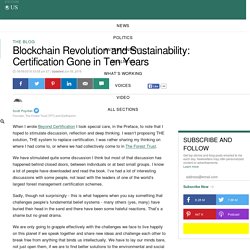
I wasn’t proposing THE solution, THE system to replace certification. I was rather sharing my thinking on where I had come to, or where we had collectively come to in The Forest Trust. Blockchain technology trialled to tackle slavery in the fishing industry. Blockchain Revolution and Sustainability: Certification Gone in Ten Years. Blockchain technology trialled to tackle slavery in the fishing industry. 3 Sustainable Uses of the Internet of Things. Blockchain: Linking Sustainability Data - Schneider Electric : Schneider Electric. Could the blockchain revolutionise sustainability? The Internet is missing one thing and the blockchain has it - trust.
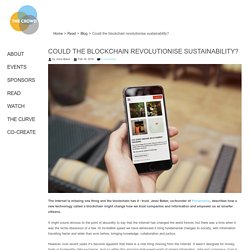
Jessi Baker, co-founder of Provenance, describes how a new technology called a blockchain might change how we trust companies and information and empower us as smarter citizens. It might sound obvious to the point of absurdity to say that the Internet has changed the world forever, but there was a time when it was the niche obsession of a few. At incredible speed we have witnessed it bring fundamental changes to society, with information travelling faster and wider than ever before, bringing knowledge, collaboration and justice. However, over recent years it’s become apparent that there is a vital thing missing from the Internet. It wasn’t designed for money, trade or trustworthy data exchange. Blockchains have the potential to bring trust to the Internet.
HomeBiogas - Turn Your Waste into Energy. Baths to washing machines: welcome to the (almost) waterless home of the future. Dry shampoos have been a morning routine game-changer, but DryBath takes hygiene hacks one step further.
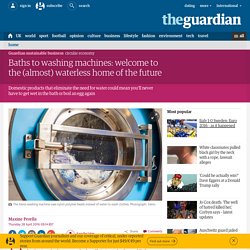
Claiming to be the world’s first bath-substituting lotion, it is among a number of emerging waterless, or near waterless, household solutions. Launched in 2012 by Headboy Industries, DryBath is a cleansing gel made of antiseptic essential oils, bioflavonoids and natural deodorant Tawas that can be rubbed and left on the skin. It was originally developed for poorer communities facing challenges around limited access to water and lack of basic sanitation. Untitled. Tesla announced today that their "Bioweapon Defense Mode" is actually real and not just a concept.
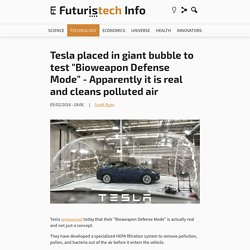
They have developed a specialized HEPA filtration system to remove pollution, pollen, and bacteria out of the air before it enters the vehicle. To test the capabilities of this system, they placed the Model X in a giant bubble with "extreme levels of pollution (1,000 µg/m3 of PM2.5 vs. the EPA's "good" air quality index limit of 12 µg/m3). " Source: Tesla. How Bitcoin Brought Electricity to a South African School. Late last month, the non-profit MIT Enterprise Forum of Cambridge hosted an event focused on new developments in clean energy distribution and how blockchain technology could play a role in how electrical grids of the future are built.

The event was sponsored by the Massachusetts Clean Energy Center, a government-funded agency that promotes clean energy expansion in the state, and included presentations from companies like IBM and startups like Consensys, Lo3 Energy and Grid Singularity. Arguably the most notable demonstration of the night came in the form of Usizo, a crowdfunding platform designed to facilitate energy payments between donors and select schools in South Africa. Panasonic, Toshiba, and Sharp in race to develop farm equipment. Panasonic is making a big move into agriculture.
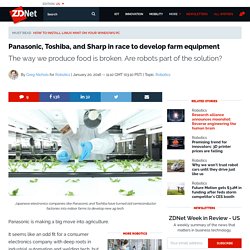
It seems like an odd fit for a consumer electronics company with deep roots in industrial automation and welding tech, but the sudden pastoral streak is part of a broader trend that's bringing the likes of Toshiba, Sharp, and Fujitsu to the family farm. At issue is the future of food. The informed opinion is that our current food production paradigm is unsustainable.
Companies that can develop a strong portfolio of technologies that make growing food more efficient are going to be well-positioned in the decades ahead. FarmedHere has high ambitions with new 60,000 sq ft vertical farm. Internet and Technology. Www.adbi.org/files/2013.10.25.wp440.asean.economic.community.progress.challenges.pdf.